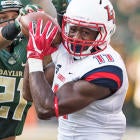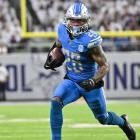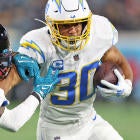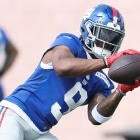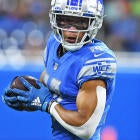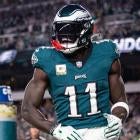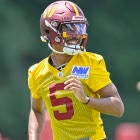The 2020 NFL Draft featured one of the best collections of wide receiver talent we've seen come out of college in quite some time, and the receiver talent is still coming off the board well into day three. A class with this kind of talent is obviously going to make a difference for Fantasy, and the Fantasy Football Today team has been reacting to each pick as they come through. We've got individual writeups for every WR drafted in the top-90, and we're continuing our coverage of the draft all the way through the end right here.
Check out those individual prospect profiles for all of the top options right here, and then scroll down for our breakdowns of the mid- and late-round targets you need to know about.
ul>
Pick No. 94: Devin Duvernay to the Ravens
The Ravens added some speed late in the third round, bringing in former Texas slot receiver Devin Duvernay and his 4.39 40-yard dash time. Duvernay wasn't very productive until his senior season at Texas, but he broke out to account for 37% of the Longhorns' receiving yardage last year. A YAC specialist with underdeveloped receiving skills, Duvernay caught a lot of passes near the line of scrimmage and does a lot with the ball in his hands after the catch. He profiles as an athlete more than a Fantasy producer, and fits into a run-first offense behind Marquise Brown and Mark Andrews, and potentially more names, not that a third pass-catcher was viable for Fantasy last year.
If Duvernay contributes — and I'd still take Miles Boykin and probably Willie Snead as better bets for 2020 — it's likely to be with some sporadic splash plays, but nothing worth banking on in Fantasy.
Pick No. 128: Gabriel Davis to the Bills
An intriguing prospect out of UCF, Davis combines a solid age-adjusted production profile with a nice landing spot for a late-round receiver. The Bills nabbed Davis in the fourth round, and while he'll have trouble cracking the field at first, he profiles as a potential long-term replacement for John Brown. The biggest question mark in Davis's game was his ability to run a full route tree, but a vertical receiver makes a lot of sense with the big arm and mobility of Josh Allen.
Davis isn't a burner by any means — he ran a 4.54 40-yard dash, which certainly isn't a bad time for a 6-2, 216-pound receiver. But he won down the field in college, as evidenced by his 81st percentile 17.2 yards per reception in college. The biggest plus for Davis is his college production — he looked like one of the best late-round sleeper options at the position based on the advanced production metrics that have done a good job of predicting receivers who can outperform their draft position.
Pick No. 142: Antonio Gandy-Golden to the Redskins
Small-school wide receivers are always interesting, and here comes one cut from the same cloth as fellow small schooler Kenny Golladay. Gandy-Golden was a dazzler at Liberty -- the 6-foot-3 5/8 and 222-pounder had over 1,000 yards and 10 touchdowns in each of his final three years! Truthfully he just dominated the competition in the Atlantic Sun Conference with his raw size and solid speed.
He's a fluid athlete for sure with good focus and hands, and while he's not a burner down the field, he does have quick feet to juke defenders. The concerns involve how he'll fare against NFL competition, but he made some head-turning plays at the Senior Bowl and definitely has potential to be a capable NFL starter. It's a little surprising he lasted as long as he did.
Look for Gandy-Golden as a top-30 pick in rookie-only drafts. That means he'll go in the second round in some, and the third in others.
Pick No. 151: Joe Reed to the Chargers
Reed ran a 4.47 at 6-1, 227, and that gives him an intriguing size/speed blend. The problem is, he was never particularly productive at Virginia despite staying all four years, and he topped out this past season with 679 receiving yards on 77 catches — so only 8.8 yards per reception. Previously, he'd been more of a deep threat, but he never hit even 500 receiving yards in that role.
At the next level, he profiles mostly as a kick returner — he put up solid return stats all four years of college — but could also develop into a rotational deep threat. But he's not someone who will be very productive for Fantasy, especially given he slots in behind Mike Williams in the pecking order for downfield targets on a team that will likely rack up underneath throws to Keenan Allen, Hunter Henry and Austin Ekeler.
Pick No. 161: Tyler Johnson to the Buccaneers
Johnson is a very intriguing receiver prospect with an absolutely dominant production record at Minnesota. There are a couple red flags, but this is a solid landing spot where he could compete for playing time in three-receiver sets, especially if the Bucs are as pass-heavy with Tom Brady at quarterback as they were with Jameis Winston.
The major concern with Johnson is the league doesn't seem to see him as an NFL athlete. Johnson broke out early in college, and was a dominant producer for the Golden Gophers through his senior season. But he didn't declare early, and he didn't receive an invite to the Senior Bowl. He also didn't do any athletic testing at the Combine, though he did some receiver drills, suggesting his camp might have been concerned about how his testing numbers might impact his draft stock.
That said, athletic testing doesn't typically predict much at the wide receiver position, and Johnson does check all the production boxes. In other words, he's already overcome whatever physical limitations he may have to be wildly productive in the Big 10; it's not out of the realm of possibility to see the route running, feel for defenses and ball skills translate to the next level, too. He won't likely see big target numbers on a stacked roster, but it wouldn't be surprising to see him outperform some of the other late-round wide receivers.
Pick No. 165: Collin Johnson to Jacksonville
The Jaguars added their second wide receiver of the draft, tabbing Collin Johnson from Texas. At 6-6, 222 pounds, Johnson is a big wide receiver. He got banged up in his senior season, which helped spark Devin Duvernay's final-season rise. But prior to that, Johnson had been the more productive of the two, and his junior season (68-988-7) qualified as a breakout campaign.
Johnson is a very different player than second-round pick Laviska Shenault, and profiles as depth for the Jaguars on the outside. If things pan out for him, it will likely be by beating out Chris Conley to play opposite D.J. Chark.
Pick No. 166: Quintez Cephus to the Lions
Cephus is a sleeper here, and is one of my favorite picks on Day 3. A strong team-adjusted producer at Wisconsin, Cephus had an impressive nine-game run as a sophomore, missed the next year due to injury, then had another strong season in 2019 before declaring early for the draft.
Cephus didn't have a great combine, notably posting the worst 40-yard dash time in the wide receiver class. But his vert and broad jumps were very good, and he also put up 23 reps on the bench, so it wasn't a complete zero. Those metrics will likely limit him to a slot role at the next level, but he should figure into the Lions plans there behind the brittle Danny Amendola.
Pick No. 168: John Hightower to the Eagles
Hightower is a burner who adds kick return ability, and he's more field-stretching depth for an Eagles team that also traded for Marquise Goodwin on Day 3 of the Draft. Obviously, DeSean Jackson is still the starter in that role, but both Jackson and Goodwin are older and not very durable.
Hightower had an impressive two-year run at Boise State and his 4.43 speed will play behind them, but it could also take some time for him to see the field. At 6-2, 189, Hightower's a thin receiver, but he adds an impressive catch radius and strong athletic testing across the board. He's a deep Dynasty stash, but one who has a shot to pay off long-term in a good landing spot for his downfield profile.
Pick No. 171: Isaiah Coulter to the Texans
The Texans continue to stockpile speed, adding Isaiah Coulter's 4.45 40-yard dash time to their huge stable of burners at the wide receiver position. Coulter is a 6-2, 198-pound receiver out of Rhode Island who didn't do much before a 1,000-yard final season. He also tested very poorly in the agility drills, meaning he's likely more limited as a downfield option than John Hightower, who went three picks before him. He's depth for the Texans because each of their top three wide receivers have overlapping skill sets with Coulter.
Pick No. 173: Darnell Mooney to the Bears
Speed is the name of the game, and Darnell Mooney is another burner grabbed in the fifth round, this time by the Bears. Mooney is a slight 5-10, 176 pounds, but ran a 4.38 40-yard dash. He was a very impressive producer in a poor Tulane passing game, breaking out with a 35% Dominator Rating as a sophomore and pushing that to 47% in his junior year, before falling back to 26% this past year. That college track record suggests he can win down the field, but he's a long shot to become a consistent Fantasy producer at his smaller stature.
Pick No. 176: K.J. Osborn to the Vikings
Osborn was a graduate transfer from Buffalo to Miami this past year, where he caught 50 passes for 547 yards and five scores. Running a 4.48, he's another guy with plus speed, and his best year was an 892-yard redshirt junior season at Buffalo where he averaged 16.8 yards per catch. Not considered a substantial prospect, he does seemingly have a path to some of the deep volume Stefon Diggs vacated, given the Vikings added Justin Jefferson in the first round as more of an intermediate weapon. The problem is Osborn wasn't highly regarded as a prospect, and doesn't have a strong production record behind him.
Pick No. 187: Donovan Peoples-Jones to the Browns
Stop me if you've heard this before — with 4.48 speed, Peoples-Jones wins on speed, though he's also got more size than many of the fifth-round picks that went before him at 6-2, 212 pounds. But Peoples-Jones is another burner who didn't produce much at the college level — he topped out with a 612-yard, 8-score sophomore season at Michigan. NFL teams are clearly prioritizing the ability to stretch defenses late in this 2020 Draft, but that type of player is frequently more advantageous from a scheme perspective than for statistical upside, and Peoples-Jones is likely yet another example. He could compete to start in three-wide sets, but the Browns won't use three receivers frequently, and Peoples-Jones won't have a high target share when he does see the field.
Pick No. 200: Quez Watkins to the Eagles
The Eagles are making certain they aren't left without deep speed on their roster after DeSean Jackson's injuries in 2019 really hampered their passing game. Watkins stands 6-feet tall and comes in at 185 pounds, and he ran a 4.35 40 at the Combine. One thing Watkins has that several of the other burners before him don't is an impressive production profile — he posted yardage shares of 34% and 36% in his final two college seasons before declaring early for the NFL Draft.
Sure, that came at Southern Miss, so competition on both his own roster and in terms of the strength of his opponents comes into play. And any late-round pick has a tough path to playing time, especially when they are the second player of a certain archetype taken by the same team (the Eagles took Boise State's John Hightower earlier on Day 3). But Watkins has the type of profile to get excited about in this landing spot if Jackson and the recently-acquired Marquise Goodwin can't stay healthy.
Pick No. 201: James Proche to the Ravens
This is a solid pick for the Ravens, particularly for Round 6. Proche is a good route runner with great hands and the versatility to line up anywhere. He's 5-foot-10 and 5/8 and 205 pounds but plays fearlessly, willing to cross the middle and get physical with taller defensive backs. He even has some speed to scoot past opponents, be it off the snap or after the catch. His smallish wingspan and body frame kept him from getting picked higher, as did his age (he'll be 24 when the season starts). But as reliable-handed receivers go, Proche was the best available when he got picked by Baltimore. He'll carry a little long-term value in dynasty/keeper leagues and rookie-only drafts with a late-round pick.
Pick No. 207: Isaiah Hodgins to the Bills
The Bills are stockpiling the analytics-type receivers. After grabbing Gabriel Davis earlier on Day 3 — not to mention Stefon Diggs, an underrated prospect once upon a time with a great production record — they nabbed one of the biggest late-round sleepers for the "production over everything" crowd in Hodgins.
Hodgins produced in his freshman season at Oregon State, then immediately jumped to a breakout season as a sophomore. He took yet another step forward as a junior, finishing with a Dominator Rating over 40%, before declaring early. That's a sterling production profile, and he did it as a 6-4, 210-pound guy who has the size to play at the next level. Hodgins' 40-yard dash time was underwhelming at 4.61, but these types of producers will always find praise about their route running and feel — and for good reason. Buffalo is suddenly flush with wide receiver talent, but Hodgins is a good stash late in rookie drafts in deeper Dynasty leagues.
Pick No. 212: Dezmon Patmon to the Colts
Indianapolis adds another big-bodied receiver in Patmon, a California kid who played football, baseball and track in high school before shipping off to Washington State. The nearly 6-foot-4 receiver took off under Mike Leach's Air Raid offense the past two seasons, totaling 119 catches for over 1,500 yards and 13 touchdowns in 26 games. Not surprisingly, it was Patmon's size that helped him win competitive catches against opponents and jump high for tall throws. He can also contribute on special teams. He ran 4.48 in the 40 but doesn't quite play that fast, and his lateral agility really isn't all that great. He's worth keeping tabs on through training camp, but Patmon figures to be stuck on the bench behind T.Y. Hilton and Michael Pittman for at least the 2020 season, if not for a while.
Pick No. 214: Freddie Swain to the Seahawks
Swain's claim to fame is having 15 touchdowns on just 68 catches in his career at Florida. But why did he have only 68 catches over four seasons? Despite being a high-profile four-star recruit, Swain couldn't find a lot of playing time until 2019 when he manned the slot and started burning past slower defenders. He's definitely a project pick for the Seahawks -- they like to take at least one in every draft. He'd be a final-round pick in Dynasty.
Pick No. 217: Jauan Jennings to the 49ers
Jennings is a big, physical receiver who has potential to be pretty good. He stood out among a crowded group of receivers during Senior Bowl practices, flashing enough speed to stack cornerbacks in drills, but really doing a good job with run blocking. He is a violent player, and can be good with jump balls. Jennings is a good late-round flier in Dynasty leagues.
Pick No. 220: K.J. Hill to the Chargers
Hill was one of the three best route-runners at the Senior Bowl, where he caught passes from new teammate Justin Herbert. He's not bulky and he's not tall, but he's got very good technique in his route running and it helps him get open. Wide receiver coach Brian Hartline prepped him well at Ohio State. Hill could eventually be the Chargers' top slot receiver, but it's going to take some time. Late-round Dynasty type.
Pick No. 246: Malcolm Perry to the Dolphins
Perry was Navy's quarterback, working in the option offense, but he's going to transition to receiver in the pros just like Keenan Reynolds did once upon a time. Perry ran for over 2,000 yards (!!) last season, throwing for just 1,000. Chances are Miami will try him out as a special-teams returner and occasional receiver since his size could keep him from being a regular player.
Pick No. 252: Tyrie Cleveland to the Broncos
Cleveland becomes the third Florida Gator receiver taken in the 2020 Draft, following Van Jefferson and Freddie Swain. He never had more than 410 receiving yards in a season, but runs in the 4.4s at 6-2, 209 pounds, so he has a wide receiver body. Cleveland was also the third receiver the Broncos took in this draft, and given they already had Courtland Sutton on their roster, he'll have a long way to go to find playing time.







